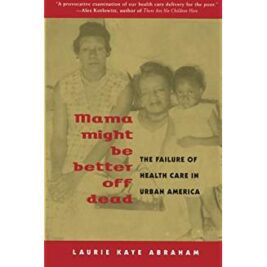
By Laurie Kaye Abraham. A look at the human face of health care by looking at the lives of four generations of a poor, African-American family beset with illnesses that are common in America’s inner-cities. Reveals an inadequate health care system that is further undermined by the direct and indirect effects of poverty. When people are poor, they become sick easily. When people are sick, their families quickly become poorer. Embedded in the narrative is a lucid analysis of the gaps, inconsistencies, and inequalities the poor face when they seek health care. Reveals what health care policies crafted in Washington, D. C. or state capitals look like when they hit the street. It shows how Medicaid and Medicare work and don’t work, the “Catch-22s” of hospital financing in the inner city, the racial politics of organ transplants, the failure of childhood immunization programs, the vexed issues of individual responsibility and institutional paternalism. Read more.
